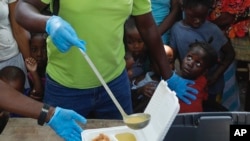Gang violence in Haiti has displaced more than 300,000 children since March, the United Nations children's agency said Tuesday as the Caribbean country struggles to curb killings and kidnappings.
Children are more than half of the nearly 580,000 people who have become homeless in the last four months. The spike in violence began in late February after a series of coordinated attacks on key government infrastructure eventually led Prime Minister Ariel Henry to resign in April.
"The humanitarian catastrophe unfolding before our eyes is taking a devastating toll on children," Catherine Russell, UNICEF's executive director, said in a statement. "Displaced children are in desperate need of a safe and protective environment, and increased support and funding from the international community."
Gangs now control at least 80% of the capital, Port-au-Prince, and the key roads leading in and out of it, with more than 2,500 people killed or injured across the country in the first three months of the year, according to the U.N.
Many children are living in makeshift shelters, including schools that are in poor hygienic conditions, placing them at risk of disease. School closures are also leading to a higher dropout rate.
The agency said children in Haiti are being forced to join violent gangs to survive as they often lack access to food, health care, clean water and sanitation. Displaced children and teenagers in Haiti also face a higher risk of sexual assault, exploitation, abuse and family separation, according to UNICEF.
The announcement comes days after hundreds of Kenyans arrived in Haiti to help rescue the country from the tight hold of armed gangs. The deployment received mixed reactions after a U.N. peacekeeping mission years ago introduced cholera in the country and was tainted with sexual allegations.
On Monday, U.S. Deputy National Security Adviser Jonathan Finer met with Haitian Prime Minister Garry Conille to discuss the initial deployment of the U.N.-backed mission to Haiti. Finer reminded Conille of the United States' strong support for accountability and oversight mechanisms as part of mission.
Haiti is also bracing for a strong hurricane season, which started earlier than usual. A tropical storm watch was in effect for Haiti's southern coast as Hurricane Beryl moved into the Caribbean Sea.




